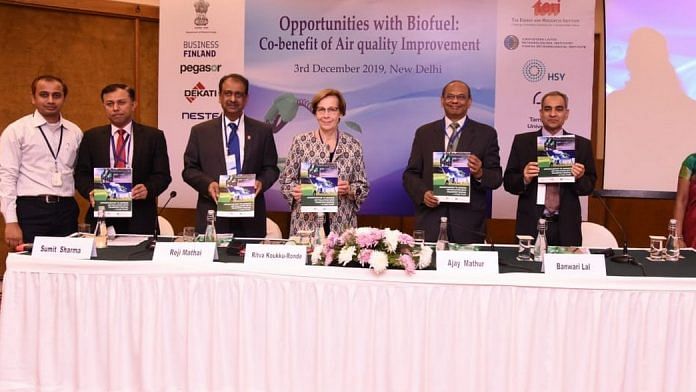New Delhi: India needs to modify ways of producing bio-diesel to prevent emission of nanoparticles that are more harmful for human health than particulate matter, a collaborative study conducted by The Energy and Resources Institute (TERI) and a team of researchers from Finland has found.
The findings were shared Tuesday at an Indo-Finnish collaborative conference, which was organised by TERI at the India Habitat Centre in Delhi. The conference was also attended by Finland’s Ambassador to India, Ritva Koukku-Ronde.
The researchers, including those from the Finnish Meteorological Institute and Tampere University of Finland, suggested possible modifications to India’s national biofuel policy to address tailpipe emissions of nanoparticles. The findings were based on case studies conducted both in India and Finland.
“We felt the issue of nanoparticles was not on the focus of scientists and policymakers. Biofuels provide us with energy security and have a huge benefit in air quality, but there are also challenges in the kinds of biofuels that we use,” Ajay Mathur, director general of TERI, said at the event.
Mathur added, “We should take advantage of bringing biofuels in, but do it in a manner that makes sure we do not inject a greater degree of environmental hazard into our lives.”
Also read: Coping with climate change harder for marginalised women, says study
Nanoparticles more harmful to human health
The National Policy on Biofuels in India aims to blend FAME (Fatty Acid Methyl Ester) biofuels with diesel through esterification/transesterification process. FAME is the generic chemical term for biodiesel derived from renewable sources.
While this helps in reducing vehicular emissions of particulate matter, it also increases the release of nanoparticles in the atmosphere.
Airborne nanoparticles (lesser than 200 nm) from diesel-powered vehicles are more harmful to human health than fine particulates (including PM2.5 and PM10), TERI researchers said in a statement.
These nanoparticles can cross the blood-air barrier in lungs, and easily penetrate animal and plant cells, causing unknown long-term effects.
There is no regulation related to nanoparticle emissions in India at present. Also, not much study has been done to inform potential regulations.
The researchers have found that the hydrodecarboxylation process of producing biodiesel helps reduce tailpipe emission of such particles. This process requires hydrogen and a suitable catalyst. But clean, non fossil-fuel-based production of hydrogen still remains a challenge.
TERI has already developed a pilot scale process for hydrogen production from sugarcane and agricultural residue biomass.
Speaking at the event, Finland Ambassador Koukku-Ronde said, “Apart from global warming, cities across the world are struggling with air pollution. According to various studies recently, the impact of air pollution on human health is far more dangerous than previously thought.”
She added, “Addressing climate change and air pollution is a huge challenge…These problems can only be tackled by working together.”
Also read: At India-Sweden dialogue on pollution, Tetra Pak and Ikea pledge to go green



